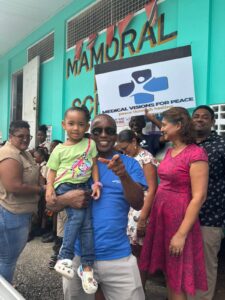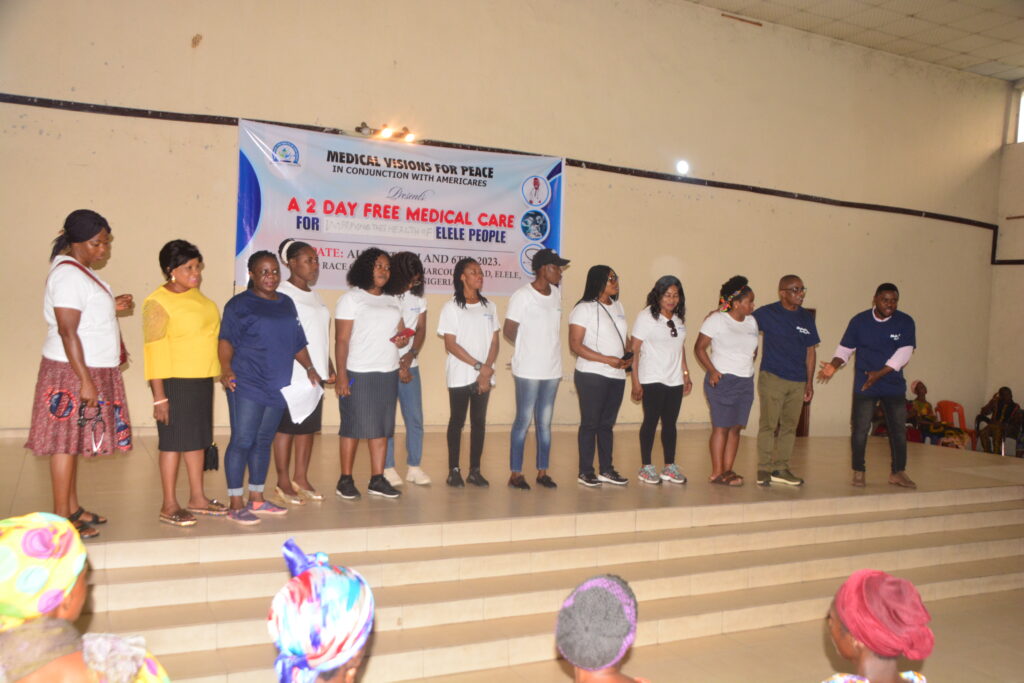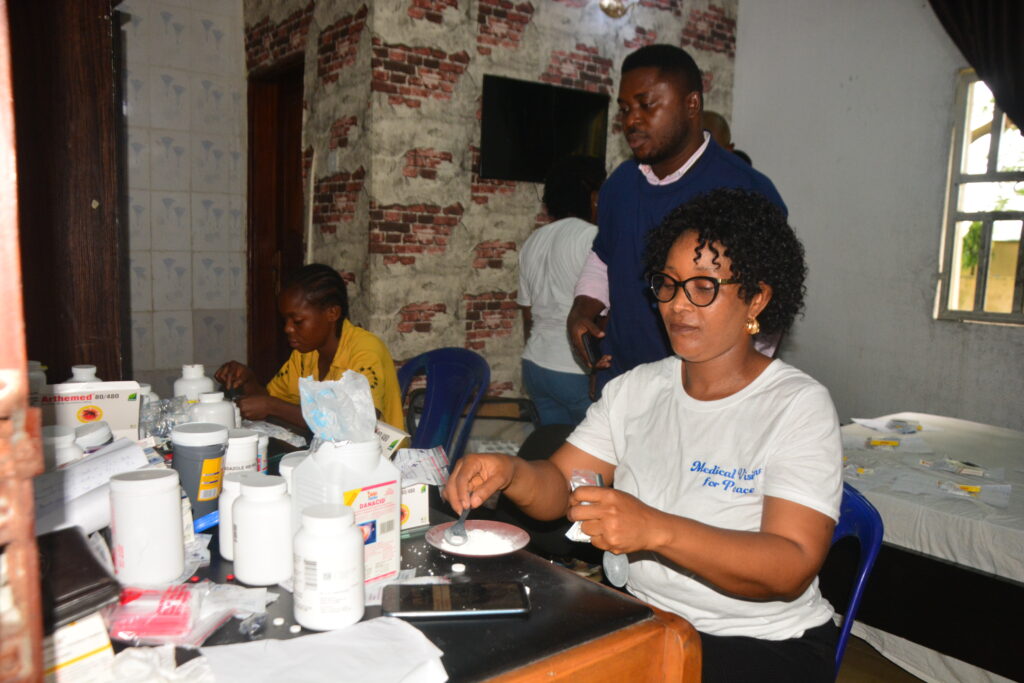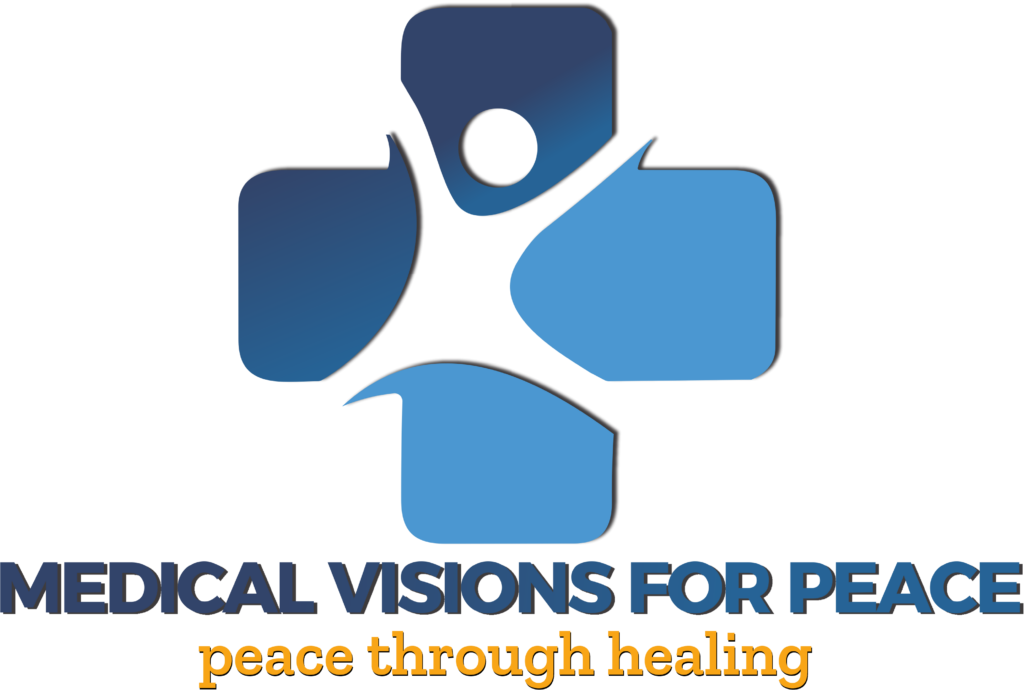
REPORT OF A 2-DAY FREE MEDICAL CARE PROGRAM ORGANIZED BY MEDICAL VISIONS FOR PEACE IN CONJUNCTION WITH AMERICARES AND ELELE HEALTH ASSOCIATION.

The medical mission aimed to provide free health care primarily to residents of Elele who are least likely to afford it.
Most beneficiaries were older adults and children, accounting for nearly 80% of over one thousand persons that received treatment.
Each day started with song sessions and health talks on various preventive and public health topics, including diabetes and hypertension. The patients were triaged, examined by medical providers, performed laboratory investigations if indicated, and sent to the pharmacy section for medications if prescribed.
The medical cases included malaria, typhoid fever, arthritis, diabetes, high blood pressure, and various bacterial infections.
Antibiotics, antimalarial, analgesics, multivitamins, ophthalmologic, antihypertensives, and anti-diabetic drugs were among those prescribed to patients.
Optometrists treated various eye ailments and dispensed corrective eyeglasses.
The healthcare volunteer team consisted of physicians, nurses, pharmacists, medical laboratory technicians, medical assistants, and crowd control personnel.
Data:
Total number of patients seen in 2 days: = 1,709
Non-Ophthalmology patients 1016
Ophthalmology patients, including adults and children = 703
Volunteers

Testimony by the volunteer optometrist from selected cases
Over the two clinic days in Elele Rivers State, Nigeria, we helped 703 patients at the vision clinic alone!
Among these patients, we saw children as young as six months old and some patients into their nineties. All patients under 20 years old with high pressures were dilated. We took intraocular pressures on all patients ten years of age and older and were able to start several of them on sight-saving glaucoma drops. Some of the cases we treated required foreign body removals and dry eyes due to meibomian duct dysfunction.
We saw a 6-month-old baby with bacterial conjunctivitis (pink eye). I was able to start the baby on topical antibiotics.
The youngest patient with glaucoma was 22 years old. We had an autorefractor reading of ‘unable to read’ because it exceeded the +/-10.00D limit. He was +10.00D in both eyes. We did not have any +10.00D glasses with us, but we did have +8.50D with a bifocal.
We had a child with severe left eyelid ptosis. We found she had a corneal ulcer for over a week, and we started her on a pulse dose of Vigamox (antibiotic drop). She was initially resistant while waiting for two hours as I returned periodically to instill her drops. Although she was shy and reluctant to talk, we became buddies during those two hours. I asked her to return on our second day to look at her ulcer. Her ulcer was virtually re-epithelialized, and we could start her on prednisolone acetate 1% (steroid eye drop) along with her antibiotics.
A child under two had an accommodative esotropia (eye turned in toward the nose) due to high hyperopia (high plus prescription) and some astigmatism. We had a pair of children’s glasses that fit him perfectly; the prescription was the closest we had. You should have seen him look around at his new world whenever we first put them on. His joyous smile relieved our stress and made the day for everyone in the room. He didn’t attempt to remove them.
Dr. Ogu Emejuru, the founder of Medical Visions for Peace, donated 600 readers, myopic single-vision glasses, and sunglasses for the mission. Sunglasses were a hit, especially the kids’ sunglasses, because patients under 20 were all dilated. Patients loved receiving a new pair of glasses and were very grateful. The patient’s faces radiated with palpable joy as each of them had the eyeglasses stuck to their faces, discovering a new world around them.
Mission Challenges

Summary
The medical outreach in Elele, Rivers State, Nigeria, was judged a huge success. As noted, many residents received health care from 9 am – 4 pm daily for two days.
Although we judged the program successful, the challenges, such as the short duration, low workforce, and insufficient drugs, presented lessons learned for future planning.
We decided on a yearly medical mission in August during our debriefing session.
Big thanks to all the Elele Health Association’s great volunteers, AmeriCares for donating free medical supplies and drugs, and CHIMATEMS for additional drug supplies.

680 Kingsborough Square,
Chesapeake, VA 23320, USA
15 Ohaeto Street, D-line,
Port Harcourt Rivers State. Nigeria
q0dsdr